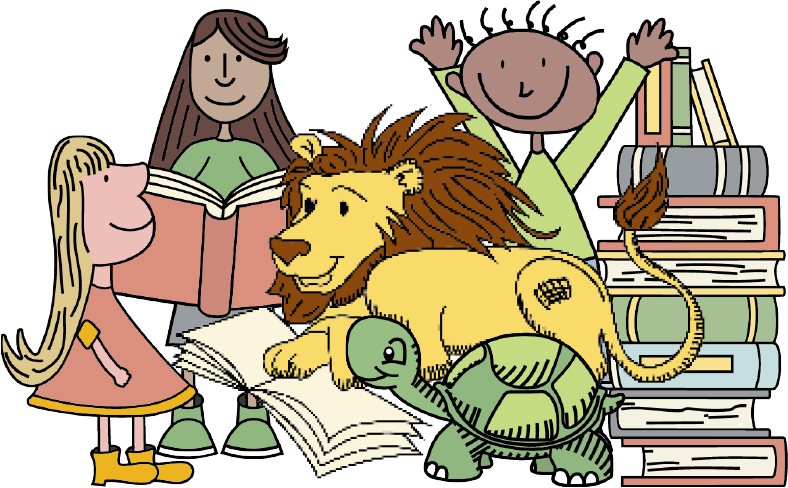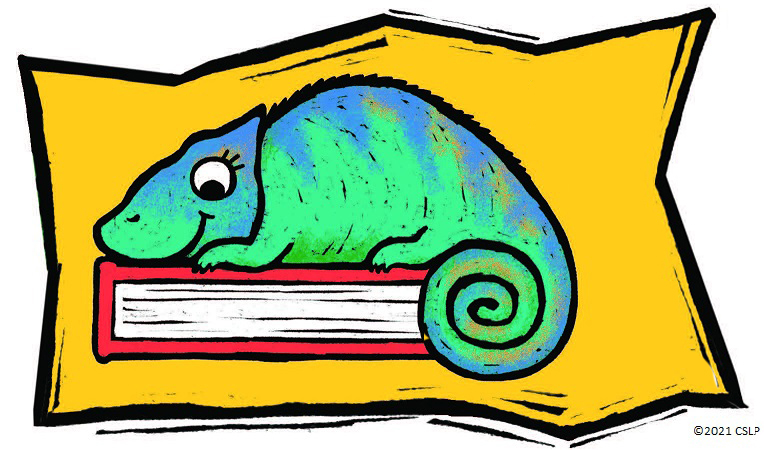Library summer reading programs help prevent a backslide in children’s learning during the long break from school.
By Erin Julius, FCPL Marketing & Communications Director
A Troubling Trend
Have you heard of the summer slide? Don’t look for it on any playground. The “summer slide” refers to reduced test scores. Studies have shown that children score lower on standardized tests at the end of summer break than they did at the beginning, according to Brookings.com. Fairfax County Public Library (FCPL) partners with the Collaborative Summer Library Program (CSLP) to produce its summer reading program.
 Summertime loss of reading skills is cumulative. By the end of the sixth grade, children who experience the summer slide are two years behind their classmates, according to the Wisconsin Department of Public Instruction (WDPI).
Summertime loss of reading skills is cumulative. By the end of the sixth grade, children who experience the summer slide are two years behind their classmates, according to the Wisconsin Department of Public Instruction (WDPI).
This slide harms children’s professional and personal futures. Good readers are better writers, make more money, and are even more likely vote in presidential elections and volunteer in their communities. Conversely, deficient readers are more likely to drop out of high school and be unemployed, according to the National Endowment for the Arts study “To Read or Not To Read: A Question of National Consequence.”
Libraries Tackle the Problem
 This problem is not new. Beginning in the 19th century, schools and public libraries started offering summer reading programs to combat the summer slide. But those early programs only existed in urban communities. Children in rural communities were too busy helping on family farms during the summer to enjoy free time for reading. Fortunately, most library systems in the U.S. now offer summer reading programs for children in all communities.
This problem is not new. Beginning in the 19th century, schools and public libraries started offering summer reading programs to combat the summer slide. But those early programs only existed in urban communities. Children in rural communities were too busy helping on family farms during the summer to enjoy free time for reading. Fortunately, most library systems in the U.S. now offer summer reading programs for children in all communities.
Studies show that library and other community-based programs offer advantages over school-based or independent programs. Since they aren’t located in school buildings, children do not have to deal with negative perceptions associated with summer school, according to the WDPI analysis.
Library programs often also are open to parent participation. Parental and caregiver involvement in reading is key to a child’s success.
The Impact of Income
Socioeconomic status (SES) is the most consistent factor identified in the relationship between summer vacation and the summer slide, with loss in reading skills increasing as income level decreases. Some studies even show, by some measures, that higher-income students actually gain reading skills over the summer. Research suggests that the summer slide creates a three-month gap in scores between middle- and low-income children, and, by the end of elementary school, lower-income children may be as much as three grades behind their higher-income peers, according to CSLP’s meta-analysis.
But exceptions exist, and that’s where library summer reading programs can help. A 2012 study in the Journal of Education for Students Placed at Risk found that children of lower SES experienced gains just like their high-income peers if they had parents who read to them or took them to the library.
An Annual Investment
 When families arrive at their local FCPL branch each summer, they find freshly stocked shelves. About $50,000 of the library’s yearly budget is allocated for summer reading materials: items that staff will use in book talks and titles they plan to recommend, as well as perennial favorites. Selection staff also purchase additional copies of Virginia Reader’s Choice Program winners and titles from The Washington Post’s KidsPost Summer Book Club book list in time for the summer break.
When families arrive at their local FCPL branch each summer, they find freshly stocked shelves. About $50,000 of the library’s yearly budget is allocated for summer reading materials: items that staff will use in book talks and titles they plan to recommend, as well as perennial favorites. Selection staff also purchase additional copies of Virginia Reader’s Choice Program winners and titles from The Washington Post’s KidsPost Summer Book Club book list in time for the summer break.
Find Virginia Reader's Choice Winners and KidsPost books in the FCPL catalog.
The Friends of George Mason Regional Library normally contribute another $50,000 for programming throughout the summer designed to supplement the reading program. Some of last year’s funding intended for programming — which was modified or cancelled due to the pandemic —was instead redirected toward purchasing eMaterials, said Dianne Coan, division director of FCPL’s Technical Operations.
See the calendar of 2021 Summer Reading Adventure programming.
Encouraging Kids’ Enjoyment
FCPL’s Summer Reading Adventure (SRA) is designed to involve the whole family, and our staff wants to make it fun!
 “One of the things that makes me saddest during the summer is when families ask for textbooks,” said Sondra Eklund, the youth services manager at City of Fairfax Regional Library.
“One of the things that makes me saddest during the summer is when families ask for textbooks,” said Sondra Eklund, the youth services manager at City of Fairfax Regional Library.
“Yes, you want them to keep reading, but let it be without pressure,” Eklund said. “You can take them out of curriculum and show them the fun side of learning.”
If children aren’t interested in reading on their own, caregivers can help by showing them the power of story, Eklund said. She suggests choosing a book to enjoy as a household and reading a chapter aloud each day. Listening to audiobooks in the car is another way to entice children into stories and motivate them to do their own reading, she said.
Find summer reading audiobook recommendations from FCPL staff.
Goals and Prizes to Get You Motivated
 This year’s SRA runs June 11-Aug. 13 and asks participants to track time spent reading, rather than number of books read.
This year’s SRA runs June 11-Aug. 13 and asks participants to track time spent reading, rather than number of books read.
“The idea is that anyone can read whatever they want for periods of time; it makes for a more equitable program that isn’t as daunting, especially for reluctant readers. Everyone benefits.” said Steve Okrend, the youth services manager at Chantilly Regional Library.
And to entice those children (or adults!) who aren’t already excited to spend time reading even though they know it’s good for them? We have prizes!
“Yes, reading ought to be a joy all by itself, but some of us benefit from the goal and incentive approach,” said Ted Kavich, FCPL’s Administrative Services Division director.
The 2021 SRA challenges all ages — preschool (birth-preschool age), school-age (grades K-5), teen (grades 6-12) and adult (ages 18+) — to read 100 minutes or choose from five activity challenges and log them online with Beanstack to earn a virtual badge.
Learn more about Beanstack in "Grow Your Reading Habit With Beanstack," and find registration instructions here.
Kids and teens will be entered into prize drawings for the chance to win: a $25 Scrawl Books gift card when they register for the challenge, a $50 Chipotle gift card when they earn five badges, and a $150 Amazon eGift card when they complete the challenge by earning 10 badges. Find out the prizes for adults!

